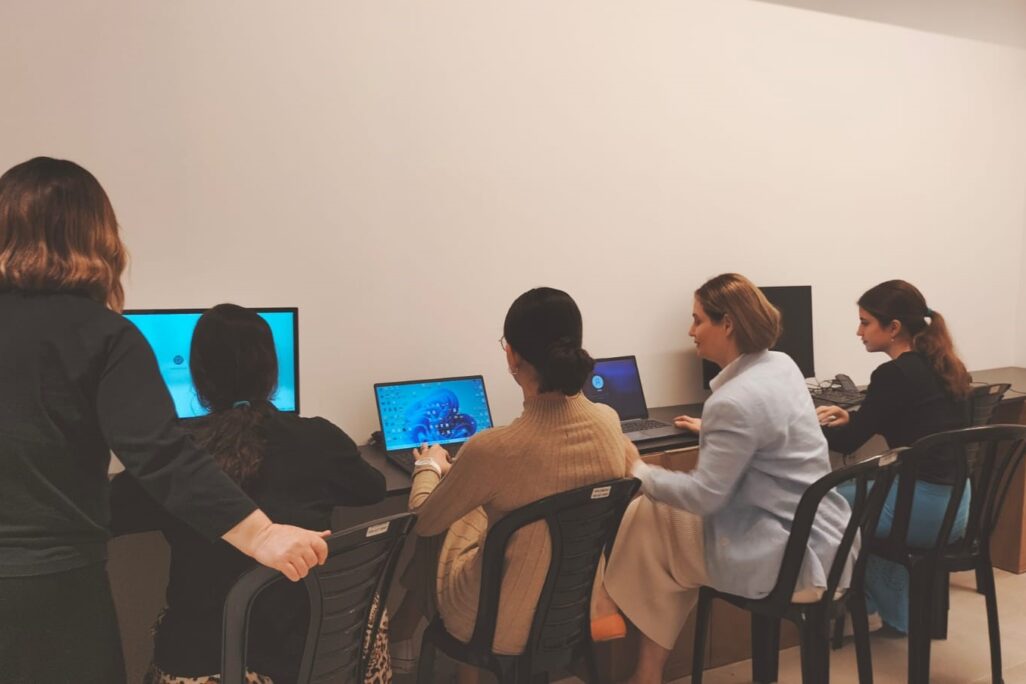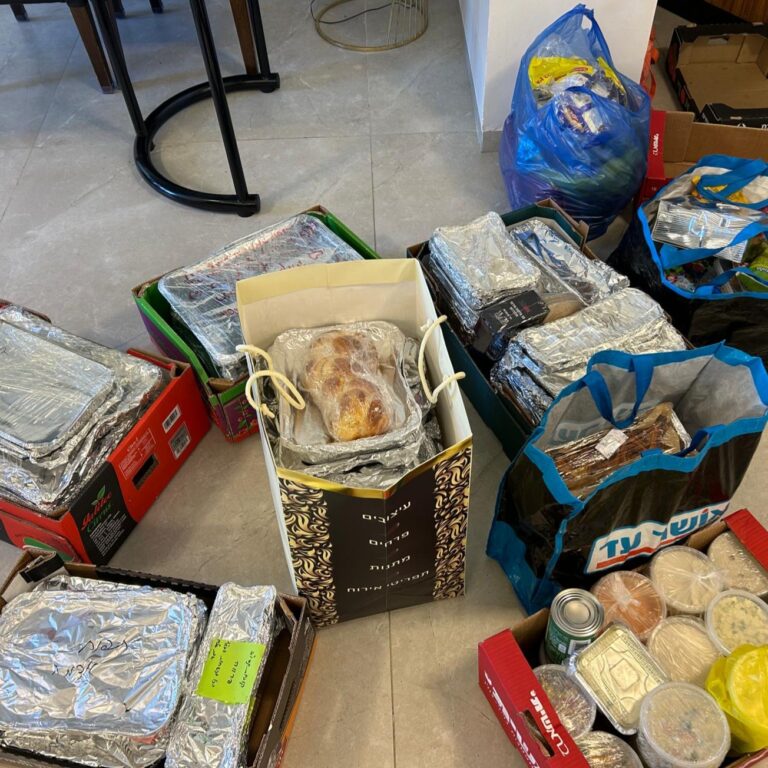
Nothing is so unusual about a group of ultra-Orthodox women sitting in a wig store. The ten ultra-Orthodox women who are at the store today, though, are neither saleswomen nor customers. They are activists, who have transformed the store into a base for their mutual aid organization, called Iron Sisters, which began operating last week. The organization is made up of women from the ultra-Orthodox community seeking ways to contribute amid the war.
The group is led by Dr. Bracha Segev, a clinical psychologist who promotes mental health in ultra-Orthodox society, and Hana Iram, from Jerusalem. Iram told Davar that the idea of starting the organization was tossed around in a WhatsApp group that Dr. Segev founded during the pandemic.
The WhatsApp group was made up of ten ultra-Orthodox women who had founded large initiatives in the past. When the war broke out, one of the members floated the question: what can we do as women? They scheduled a conference call, where they decided to form an organization with the principles of “sisters standing together.”
The word “sister” holds a lot of meaning for Iram, who explained that “a sister is any woman from a family with wounded or missing, any family that is grieving or has members serving as reservists.”
She told Davar about the two organizing ideas behind Iron Sisters.
“The first is to act out of a personal and warm connection,” Iram said. “The second is to be present for a long time, even after other organizations have left.”
The organizational structure of Iron Sisters took shape rapidly: a coordinator for each region of the country activates volunteers in the region according to the needs that arise.
“We spread a message that we were looking for regional coordinators, and within two hours we had applications from 300 women,” Iram explained. “We currently have 150 designated regional coordinators throughout the country.”
The project’s operational hub is located in a large wig shop in Jerusalem, which was closed due to the war and whose owners allowed the project to use it.
“We set up an information center there, we brought laptops. There is a team that works here every day from ten in the morning until six or seven in the evening,” Iram said, adding that some of the women are not working currently because of the war, while some come outside of working hours. “You find ways to manage—there are babysitters, their husbands are supportive.”
“They know what female power is”
The project has two courses of action. One is a response to immediate physical needs that have arisen from the state of emergency, such as hosting families that have been displaced or finding kosher food in hotels of evacuees. These needs are brought to Iron Sisters by other groups of volunteers throughout the country. The second is building personal relationships between women, enabling more daily help on a continuous basis.
Iram told of a request they received on Thursday from a volunteer center in Jerusalem, about 160 evacuees in Jerusalem hotel who needed strictly kosher food.

“We discussed this with regional coordinators who coordinate collection points and cooks from the neighborhoods, and we put together 320 full Shabbat meals—challah, wine, desserts, fish, and meat,” she said.
Iron Sisters has also received requests for help from IDF bases for kosher food.
“You have to understand that most of the women are mothers from families with many children, most of them volunteer and cook crazy amounts,” Iram said with pride. “They turn to us because they know what female power is.”
After hearing from families from Tel Aviv who want to be hosted in an ultra-Orthodox environment, she recruited 29 host families in a matter of hours. In another case, Iram corresponded with an ultra-Orthodox woman who was debating whether or not to take in a family.
“She wrote to me that on the one hand she is on maternity leave and is very busy, and on the other hand, she wants so much to give and has room in her house,” she said. “Today she told me that her mother-in-law came and helped arrange the house, and that she was ready to take in the family.”
According to Iram, the second line of action, where an ultra-Orthodox volunteer is paired with a woman or a family in need of assistance, will gradually become the center of Iron Sisters’ activity.
“We are creating connections where any woman can meet her family’s needs,” she said.
“A woman evacuated from the south has many needs, such as a babysitter, a place to cook, emotional support,” Iram continued. “She doesn't know how long she will stay in the place where she was evacuated to, the information center she contacted said they would get back to her and they didn't, she has children with post-traumatic stress disorder. She needs a supportive shoulder, she needs what a woman can give to another woman.”
In this type of case, the regional coordinator can call the woman, ask her how she is and register her needs. If needs arise that require a professional response, psychological or legal for example, they can turn to organizations that provide that.
“I tell her: I’m your contact woman. I’m here for you. And if another need arises next week – call me,” Iram said.
“Lots of ultra-Orthodox women manage their own lives”
Iram explains the large number of female volunteers in the project by saying that volunteering is very acceptable in the ultra-Orthodox community.
“We have also received requests from men, and we said that we focus on women’s story,” Iram said, when asked about the place of men within Iron Sisters. “But most of the inquiries we receive are ’me and my husband’—things happen totally together. An ultra-Orthodox woman who runs a family with many children cannot do anything without her husband’s backing.”
Iram’s vision, beyond the ability to give help to those who need it, is to expose the power of ultra-Orthodox women to wider society.
“They are superwomen—women who work full-time jobs, volunteer, do huge things. I want this power to be revealed to the rest of Israeli society,” she said.
According to her, ultra-Orthodox women are seen as being forced to live a strictly religious lifestyle with harsh restrictions. She gives as an example the protests invoking Margaret Atwood’s dystopian novel “The Handmaids’ Tale” in protests against the legal reform, which represents the danger that religious coercion carries towards women.
“This is a misconception. I’m sure there are women in the ultra-Orthodox sector that this is their reality, but this is also true in the general sector,” Iram maintained. “There are many powerful ultra-Orthodox women, who manage their lives from start to finish, who have endless possibilities. They manage a family with many children alongside a career, they want to contribute, they want to advance.’
Iram explained that she wants eventually to be able to pay wages to the women currently volunteering at the Iron Sisters center, if the war is to continue for an extended period.
“It is important for me to reach the women who were affected by the war in order to focus the efforts in the places that need them the most,” she said. “Maybe we will organize a fundraising campaign. I have 1,000 volunteers today, and I want to have a budget to send them flowers on Shabbat as a sign of thanks.”
“I dream that in a month, the war will be behind us and we will sit together and do something nice,” Iram said. “I want them to understand that we are there for each other. Let’s get rid of divisions."






